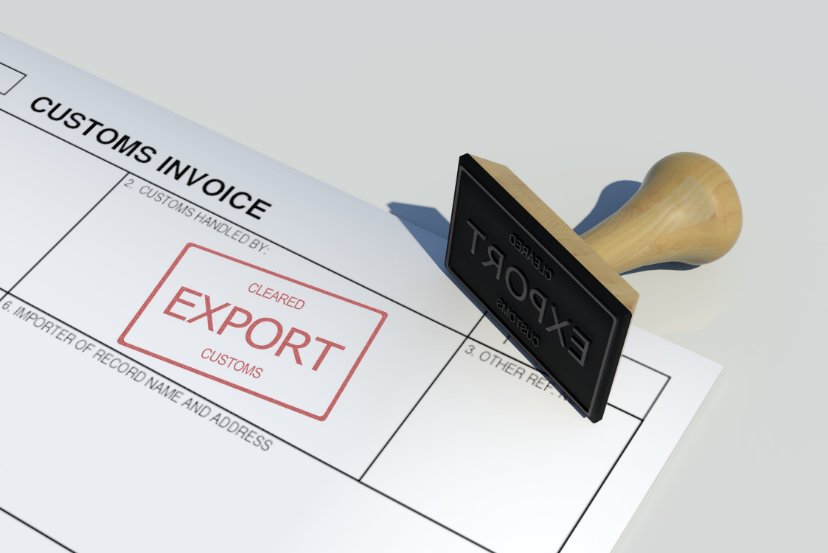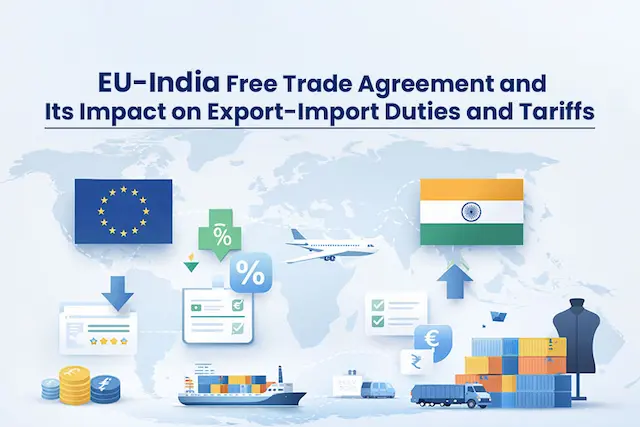Customs clearance is an essential step for businesses involved in importing or exporting goods. This process entails meeting specific government regulations to facilitate the movement of commercial cargo across borders.
To achieve customs clearance, businesses must prepare and submit relevant documents, either electronically or physically, along with the consignment. These documents aid authorities in assessing applicable taxes and duties on the cargo.
The exact documentation requirements vary based on factors such as the nature of the goods, their origin, and their destination. However, there are standard documents that most businesses must provide for customs clearance, tailored to the specifics of their trade operations.
Documents Required For Exports Customs Clearance

Here’s a list of documents required for exports customs clearance:
- ProForma Invoice
- Customs Packing List
- Country of Origin or COO Certificate
- Commercial Invoice
- Shipping Bill
- Bill of Lading or Airway Bill
- Bill of Sight
- Letter of Credit
- Bill of Exchange
- Export License
- Warehouse Receipt
- Health Certificates
List of Documents Required for Imports Customs Clearance

Here’s a list of documents required for imports customs clearance:
- Bill of Entry
- Commercial Invoice
- Bill of Lading or Airway Bill
- Import License
- Certificate of Insurance
- Letter of Credit or LC
- Technical Write-up or Literature (Only required for specific goods)
- Industrial License (for specific goods)
- Test Report (If any)
- RCMC Registration cum Membership Certificate
- GATT/DGFT declaration
- DEEC/DEPB/ECGC License for duty benefits
Understanding The Documents
Let’s understand each and every document required for import-export customs clearance below:
A Pro Forma Invoice serves as a declaration of the exporter’s intent to sell a specified quantity of goods, detailing agreed-upon terms and conditions between the exporter and importer. It acts akin to a preliminary contract, typically communicated via email, fax, telephone, or in person.
This document precedes the final sales transaction and resembles a Purchase Order, outlining the items to be sold and their respective terms. It provides both parties with a clear understanding of the proposed transaction before it is finalized, facilitating smoother business operations and ensuring mutual agreement on the terms of sale.
Read More
A Customs Packing List shows what’s in a shipment. It helps everyone involved in the deal compare it to the Pro Forma Invoice. This list goes along with the international shipment and helps transportation companies understand what’s in each container. They attach a packing list to each container to make sure they’re sending the right stuff overseas.
Matching the packing list to the Pro Forma Invoice helps make sure everything is handled and tracked correctly. This way, mistakes are less likely, and the customs process is smoother for everyone involved in the trade.
Read More
A Country of Origin (COO) Certificate, issued by the exporter, confirms that the goods in the shipment originate from a specific country, affirming their complete acquisition, production, or processing there.
Read More
A Commercial Invoice is an essential requirement for any export transaction. It’s typically the first document requested by customs clearance authorities, offering comprehensive details about the order. This includes descriptions, selling prices, quantities, packaging costs, and weights or volumes of the goods.
The information provided helps determine the customs import value at the destination port, as well as factors such as freight insurance, terms of delivery, and payment arrangements. Customs representatives scrutinize this document to ensure alignment with the order specifications, making decisions on whether to clear the shipment for onward forwarding or not. Essentially, the Commercial Invoice serves as a crucial record of the transaction, facilitating smooth customs clearance and trade operations
Read More
A Shipping Bill serves as an official declaration of goods being exported, providing a tangible record of the transaction. Exporters can submit it electronically via custom online software like ICEGATE.
To obtain a shipping bill, exporters typically require several documents, including GR Forms for shipments to all countries, a Packing List detailing content specifics, an Export License, Indent, Acceptance of Contract, Invoices containing comprehensive information such as package numbers, quantities, prices, and correct goods specifications, a Purchase Order, Letter of Credit, AR4 and Invoice, Examination or Quality Control Certificate, and Port Trust documents. These documents collectively facilitate the smooth processing of export shipments through customs and port authorities.
Read More
The Bill of Lading is a crucial legal paper given by the carrier to the shipper. It proves there’s a deal to transport goods, with details about what’s being shipped, like type and quantity. This document serves as a receipt when the goods arrive at the destination port. It’s vital for customs clearance, so the exporter needs to show it to the customs official.
Whether goods are shipped by sea, air, or land, this document is a must. It needs signatures from the carrier, shipper, and receiver to be valid. The Bill of Lading is especially helpful if anything goes missing or gets stolen during transit, as it helps track the shipment and protects everyone involved in the transportation process.
Read More
The Bill of Sight is a form exporters use when the receiver isn’t sure what’s in the shipment. It lets the receiver check the goods before paying any customs duties. If the exporter doesn’t have all the necessary info and documents for the regular bill of entry, they can apply for a Bill of Sight instead.
This document acts as a temporary substitute. Along with the Bill of Sight, the exporter must also send a letter allowing customs to clear the goods. This process ensures transparency and gives the receiver peace of mind by allowing them to inspect the shipment before committing to any duties or taxes.
Read More
A Letter of Credit is a document from the importer’s bank, assuring the exporter that the importer will pay the specified amount for the transaction. The exporter typically receives this letter before sending out the goods, as it guarantees payment. Depending on the agreement between the exporter and importer, the shipment is only dispatched once the exporter has this assurance from the importer’s bank. This letter acts as a safeguard for both parties, ensuring that the payment will be made as agreed upon in the transaction.
Read More
A Bill of Exchange offers another way for importers to pay exporters for received goods, either immediately or at a later specified date. It works like a promissory note, which can be issued by banks or individuals. This document allows for flexibility in payment timing, as importers can choose to settle the amount due when it’s convenient for them.
Similar to checks, Bills of Exchange can also be transferred to others through endorsement. Overall, it provides a convenient and secure method for completing transactions between exporters and importers, offering flexibility in payment terms and facilitating smoother trade operations.
Read More
An Export License is a must-have for businesses planning to ship products internationally. It’s required for customs clearance when exporting goods for the first time. Depending on what you’re exporting, the license may differ. Getting one involves applying with the licensing authority, and it’s issued by the Chief Controller of Exports and Imports.
This license ensures that businesses comply with export regulations and helps streamline the shipping process. Once obtained, it allows companies to legally export their products to international destinations, opening up new opportunities for trade and growth.
Read More
A Warehouse Receipt is issued after the exporter settles all export duties and freight charges following customs clearance, specifically when an Inland Container Depot (ICD) is part of the process.
This document serves as proof of ownership for goods stored in a warehouse, indicating that all necessary fees have been paid. It’s an essential requirement for transactions involving ICDs, providing assurance that the goods are ready for storage or onward transportation.
Read More
Health Certificates are essential for international trade involving food products of both animal and non-animal origin. These certificates confirm that the food items in the shipment meet stringent safety standards and regulations, ensuring they are safe for human consumption. They are exclusively required for shipments containing food products and are issued by authorized governmental organizations in the country of origin.
These certificates serve as crucial documentation, attesting to the quality and safety of the food being exported. By obtaining health certificates, exporters demonstrate compliance with international food safety regulations, providing assurance to importers and regulatory authorities regarding the suitability of the products for consumption. Thus, health certificates play a vital role in facilitating the smooth and safe trade of food products across borders, safeguarding public health and maintaining consumer confidence in the global food supply chain.
Read More
Bill of Entry
A Bill of Entry is a crucial legal paper that importers, Custom House Agents (CHAs), or carriers must complete and sign. Once filled out and submitted along with other required documents, customs authorities assess and examine the goods. This examination ensures that the imported items comply with regulations and are accurately declared.
After this process, importers can claim Input Tax Credit (ITC) on the goods if eligible. Essentially, the Bill of Entry initiates the customs clearance process, allowing authorities to verify the goods and enabling importers to claim benefits like ITC. It’s a vital step in importing goods, ensuring compliance with customs regulations and facilitating smooth trade operations.
Import License
An Import License is necessary for bringing certain goods into India that are restricted by the government. This license acts as permission granted by the authorities to engage in import activities involving these restricted items. To obtain an Import License and enjoy its benefits, individuals or businesses must submit an application to the licensing authority.
This process ensures that only authorized entities can import restricted goods, helping regulate the flow of such items into the country. Importers must comply with the regulations set by the government and obtain the required licenses to avoid legal issues and ensure smooth import operations. Overall, the Import License system helps maintain control over the importation of restricted goods and promotes compliance with national laws and regulations.
Insurance certificate
An Insurance Certificate is a vital document necessary for clearing customs during the importation process. Its purpose is to assist customs authorities in verifying the shipment, particularly regarding whether the selling price includes insurance coverage. This certificate aids in accurately determining the total value of the goods, which directly impacts the calculation of import duties.
By providing information on insurance coverage, the Insurance Certificate helps ensure transparency and accuracy in assessing the value of imported goods. Ultimately, this document plays a crucial role in facilitating customs clearance procedures and ensuring compliance with import regulations. Importers must include the Insurance Certificate to provide comprehensive details on insurance coverage, assisting customs authorities in making informed decisions regarding import duties and taxes.
RCMC Registration cum Membership Certificate
The RCMC (Registration cum Membership Certificate) is a document issued by Export Promotion Councils of India. If an exporter or importer wishes to access benefits under schemes governed by the Foreign Trade Policy (FTP) or any Export Promotion Councils (EPCs), they must provide their RCMC during customs clearance.
This certificate essentially serves as proof of registration with these councils, enabling exporters and importers to take advantage of various trade-related benefits and incentives offered by the government. It’s a necessary step for those looking to participate in international trade and benefit from the support provided by the government through its trade promotion policies.
GATT/DGFT Declaration
Every importer needs to submit a GATT/DGFT declaration during customs clearance for imports, as per the guidelines outlined in the General Agreement on Tariffs and Trade (GATT). This declaration is crucial for determining customs duties and taxes on imported goods. The declaration form must be filled out accurately and completely by the importer or their representative.
It’s essential to maintain three copies of the declaration: two for customs administration and one for the declarant. These forms should be kept with the detailed customs declaration for a period of three years. Importers must ensure compliance with all requirements and accurately fill out the declaration form to facilitate smooth customs clearance processes.
Technical Write-Up
A Technical Write-Up is a document needed for certain goods, detailing their features and usage to facilitate their handling. This document provides authorities with a clear description of the product, aiding in defining its characteristics and understanding any added value associated with it.
By outlining the product’s specifications and functions, the Technical Write-Up enhances comprehension and ensures efficient handling by both authorities and stakeholders involved in the import/export process. It serves as a valuable tool for conveying essential information about the goods, promoting clarity and accuracy in customs procedures and trade transactions.
Industrial License
An Industrial License might be necessary for importing certain goods. This license serves as proof for importers seeking to benefit from import duty concessions or other incentives. It essentially validates the importer’s eligibility for such benefits. In some cases, presenting a copy of the industrial license becomes mandatory as part of the customs clearance process for importing goods.
This document ensures compliance with regulations and demonstrates the importer’s authorization to engage in industrial activities related to the imported commodities. Importers use the industrial license to avail themselves of various benefits offered by the government to promote industrial growth and trade. Therefore, obtaining and presenting an industrial license is crucial for importers looking to take advantage of incentives and concessions while importing specific goods.
Final Words
Ensuring proper documentation is crucial for smooth import-export customs clearance. Each document serves a specific purpose, from confirming product details to proving eligibility for duty benefits. By understanding and fulfilling these requirements, businesses can navigate customs procedures efficiently and avoid delays or complications. Whether it’s obtaining licenses, providing invoices, or submitting technical descriptions, adhering to these guidelines facilitates seamless trade transactions, benefiting both importers and exporters.




